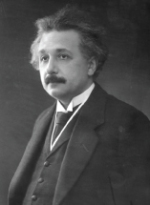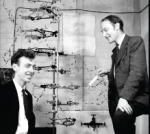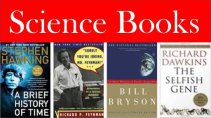Secrets of being a Great Scientist
Scientist's Quotes
*To produce a really good biological theory one must try to see through the clutter produced by evolution to the basic mechanisms lying beneath them, realizing that they are likely to be overlaid by other, secondary mechanisms. What seems to physicists to be a hopelessly complicated process may have been what nature found simplest, because nature could only build on what was already there.
Secrets and Advice
VIDEOS: How to be a great scientist: Part 1 Part 2 HHMI-Thomas Cech: on becombing a scientist How to be a scientist
The Seven Habits of a Highly Successful Scientist
by ALAN MARNETT (http://www.benchfly.com/blog/the-seven-habits-of-a-highly-successful-scientist/)
It’s been over twenty years since Stephen Covey first published his best-selling self-help book The Seven Habits of Highly Effective People. That means it’s also been over twenty years that we’ve been pushing “reading it” to the bottom of our to-do list (“Let’s see, I could either set up another experiment or read some cheesy self-help book…”). But 15 million copies don’t sell themselves, so we figured it was time to take a look under the cover. In the interest of your to-do list (and wallet), we’ve adapted Covey’s principles to create The Seven Habits of a Highly Successful Scientist…
Successful Scientist Habit 1: Take charge of your bench
It’s called “your project” for a reason. Own it. A successful scientist proactively develops hypotheses, designs experiments and tests ideas without waiting for someone to tell them exactly what to do. Sitting around waiting for instruction will most likely just lead to a sore butt, not an exciting career.
What can we do: Challenge yourself to come up with one idea related to your project each day. Some of them will be bad, really bad (“Is it possible to put a pig’s head on a dog’s body?”), but many will be good. When you hit upon a good idea, take steps to plan out the experiment. If you don’t have the necessary equipment, find someone nearby that does and see if you could use it. Research is full of roadblocks and if you’re not constantly searching for detours, you’re in for a long trip (and not this kind of trip…).
Of course, taking charge of the bench isn’t limited to experiments. Want to write a review with your PI? Tell them. Propose a topic that you would be well-suited to write see what they say. Great scientists aren’t passive- they create their own opportunities.
Successful Scientist Habit 2: Set a goal from the start
Why set goals? Anyone who’s driven on a cross-country vacation with the family knows the power of a goal. Twelve hour days in the car, bladder-expanding stretches without bathroom breaks and fast food meals while driving. It’s not always pretty, but with a destination in mind there is no time for distractions (guess you’re going to have to see the world’s second largest ball of twine on your own time…).
What can we do? Pull out a piece of paper (or open a Word doc) and write down your goals for whatever project you’re undertaking. “Graduate in five years”, “Synthesize and purify the molecule in three months”, “Publish a paper once a year”, etc. Whatever it is you want to accomplish, write it down and make sure it stays within your field of view. Literally- post it on the wall, put it in your drawer, tattoo it to your forehead – do whatever it takes to keep the destination in mind. Just go easy on the bladder and take your meals outside of the lab…
.
Successful Scientist Habit 3: Prioritize
“Get a tenure track position” is an excellent goal, but maybe “get into graduate school” should be a higher priority after college than looking through the classified ads for academic positions… There is always another experiment (or ten) to set up and if we’re working on multiple projects, those numbers quickly get out of hand. Identifying the experiments that will benefit us most will help ensure we don’t spend five years chasing a result that nobody cares about anyway.
What can we do? Take a look at your goals and rank them in order of importance to you. Then be a mercenary and spend your time performing only those experiments that get you closer to completing your goals. This can be easier said than done as we often develop an emotional bond with a project. Unfortunately, there just isn’t enough time in a day to do everything we want to so some tough choices will have to be made.
.
Successful Scientist Habit 4: Design “win/win” experiments
Everyone loves when the high risk, high reward experiment actually works. Unfortunately, these homeruns only clear the fence about 1% of the time. So accumulating six figures for a paper with a 1% success rate = 594 failed experiments. The problem with high-risk experiments is that the negative result often tells us nothing, other than it didn’t work. The best type of experiments are the ones where the result advances the project no matter what the outcome. Positive or negative, A or B, red or green. These “win/win” experiments are the result of careful planning.
What can we do? When planning the next experiments, consider whether all of the outcomes will tell you something. If they won’t, think about why and see if there’s a way to expand the experiment to fix it. Maybe it’s more controls, maybe it’s a different setup. It’s not always possible to design a win/win situation for every experiment, but forming a habit of thinking about it will ensure you catch the times you can.
Successful Scientist Habit 5: Listen first, then speak
When dealing with a boss, a colleague or a collaborator proper communication is key. Productive relationships with other scientists can be the difference between success and failure, particularly in a profession that relies so heavily on peer review.
What can we do? Unfortunately, not everyone sees the world through our lens. Next time the boss says something you don’t completely agree with, before firing back with a response, take a minute to think about why they said it. Believe it or not, your boss is human and they say things for a reason. Sure, it may be incredibly frustrating when it’s not what you want to hear, but there’s always more to the story. Just as with experiments, try to make personal interactions “win/win” so that both parties benefit in some way.
Successful Scientist Habit 6: Collaborate
English clergyman and poet John Donne said “No man is an Island, entire of itself; every man is a piece of the Continent, a part of the main.” This is particularly true in science, where it’s very difficult to perform a project in complete solitude. Collaborations are a great way to gain extra rewards for a limited amount of work.
What can we do? Find a collaborator. Look around the lab, department or field for someone you think might be interested in working together on a project and pitch them on the idea. Examine your project for areas where you don’t have the time or expertise to push it forward and consider using the collaborator to get around the roadblock. A great collaboration can make your career- think Brown & Goldstein, Bishop & Varmus, Jake & Elwood…
Successful Scientist Habit 7: Step away from the bench
It was almost universally agreed upon in a previous poll that becoming a great scientist requires hard work and discipline. While this is certainly true, it assumes that the hard work is efficient so that the project is moving forward as a result of the effort. As we progress throughout our development at the bench, we should become more productive. This means fewer mistakes, better experiments and a perspective on where our work fits in to science at large.
What can we do? Identify and nourish the elements in your personal and professional lives that make you more productive at the bench. Is it learning new techniques, getting the proper amount of sleep, reading more papers, taking more classes? Regardless of what solution works for you, periodically step away from the bench to recharge. Hard work is a lot less valuable if it’s not moving you forward.
How to become a successful scientist
by ALAN MARNETT (http://www.benchfly.com/blog/ten-ways-to-be-a-successful-scientist/)
Standing in the magazine section of Walgreen’s, I ran across a list of the “Top 10 ways to run a risky business”. As I read it, it became clear that the principles were arguably more relevant to creating a successful scientist! I’ve reworked the list and tailored it to the bench researcher and our experiments in the laboratory. Interestingly, the title of the original list included the word “risky”. Considering the inherently risky nature of scientific research, I think the list is more appropriately titled:
1. Do the experiment.
It’s fun to sit around and talk about hypothetical data and all of the potential implications, but at some point, we have to test the hypothesis. The sooner the better.
2. Realize nobody knows the outcome.
Science is exciting because we work at the edge of knowledge. The flip side of that is that it’s very hard to see where our project will lead. Recognize it’s a journey and we’re just following the data.
3. Don’t overthink it.
There will always be reasons an experiment could fail. Lab experiments without risk are lab experiments without fun. A successful scientist rolls the dice.
4. Experiments don’t fail.
They give us information. Maybe that information is telling us that dropping our flask on the ground was not a good idea. Data collected. Lesson learned. Next experiment.
5. It might fail.
Get comfortable with this idea. We will face far more failures than successes. Not one person in the history scientific research ever had a career without a failed experiment. Ever. We all fail. So what?
6. Don’t stop learning.
Try a new technique. Consider switching fields. Scary? Absolutely. But it’s more fun to be scared than bored. And most of the time, we find our fear was irrational anyway.
7. No project is safe.
If an experiment is 100% predictable, then it’s either already been done or it’s just not interesting. Learn to gauge risk, but don’t let it stand in the way.
8. Analyze the data and be confident.
Second-guessing ourselves can be a killer. Make the best decision with the data at hand and move forward. Future lab experiments may disprove our hypotheses, but that’s how science works.
9. What will we really lose if it fails?
Time, money? We knew these risks coming in. Double down and take a hit.
10. We don’t have to re-write textbooks.
Don’t get stuck waiting for the nobel prize-worthy idea. Starting with small, easily-addressable questions often opens the door to much bigger ideas than we could have imagined.
Had any success with these steps in your own career? Are there other guidelines you live by to become a successful scientist?
Tips on how to be an effective scientist
By Mark Changizi, PhD | Jun 29, 2012 (http://www.creativitypost.com/science/tips_on_how_to_be_an_effective_scientist2)
(1) [Turing tape] You need an idea notebook.
It is provable that Turing machines with more tape can carry out more complex algorithms. Without a notebook, you forget the beginnings of all your potentially great ideas, and with a notebook you can systematically build on your idea, not losing where you were once you set the work down.
From about 1998 I have about 26 notebooks; I split each page into two vertical strips, and write small. More information per page helps you integrate things better. I also now have a “meta-notebook” that keeps just the best ideas, and the hope is that it lasts while I go through a dozen or more main notebooks. Without this, many of your great ideas can even be lost within your own notes.
(2) [Open-minded] Do not aim to solve some specific problem.
In fact, do not even confine your brainstorming to any particular sub-discipline. The odds of getting a great idea in any given area are very low, so you need to allow your brainstorming travels to go anywhere. As true for your first discovery as for your tenth-- perhaps more true of the tenth, because then there are fewer discoveries left!
Sometimes it is easier to make an important discovery in a field when you are somewhat ignorant, because you don’t know what “everyone knows." Avoid becoming psychologically invested in an idea too early, lest you waste time on it.
However, once you think there is some potential, you can’t give up too early. Very often the true idea you end up with differed from your first idea you thought had potential, and it was only after delving into the literature with your idea in hand that you realized that your fuzzy intuition wasn’t quite coherent, but the modification was.
Note that sometimes the best way to motivate yourself to learn a discipline is when you have your own idea first. You’ll read attentively now.
(3) [Proliferate and select] You may need 10 to 100 ideas before you find a good one.
Your idea has a lot of hurdles before it. It must be coherent, interesting, true, testable, and publishable. Keep brainstorming, constantly, set a very low threshold to writing an idea down.
No idea is too embarrassing. Some of my best ideas seemed embarrassingly crazy when I first conceived of them.
(4) [Aloof] Avoid feeling part of any specific academic community.
When you become part of any community, you learn all the personalities—both your peers and the bigwigs. You naturally can’t help but want to impress them, to even become them. That’s just human. You learn from the community the “big problems” they respect. You learn about the problems in other fields that they “poo-poo.”
All this serves to greatly constrain your ability to find a great idea, because it makes you psychologically less able to go outside your own community, and it can happen without you ever noticing. Not only are you less able to take up other kinds of problems, but it makes you less able to freshly see the problems in your own community, because you are too much of an insider. You know what “everyone knows.” That is, “Everyone knows X,” and so you wouldn’t dare put forth ideas contrary to X, and you wouldn’t even realize you were being deferential in this way.
You need to be an outsider so that you are free to stick your middle finger up at the discipline, in the form of an idea that contradicts “what everyone knows." A corollary: avoid conferences. Staying aloof does not locally optimize your career, because of the relative dearth of contacts, but it can help globally optimize your career, via your research standing out.
(5) [Be the boss] Avoid working for anyone, and that includes a granting agency.
For your graduate career, try to secure yourself some time to pursue ideas of your own, in addition to the ideas of your advisor. For your postdoc, apply for a fellowship where, if you get it, you are free to research as you wish. Or, find a lab where the PI is likely to let you point the way to some extent.
For your job, avoid universities and departments where grant demands are unreasonably high -- when you have a grant, it typically means some granting agency is your boss, unless you’re so lucky that you proposed to do exactly what was the most significant research direction for you. For example, if you are the lone theorist amongst experimentalists, then because everyone else needs a million dollars every two years, you’ll end up needing that much too because it becomes the social-merit-yardstick of success, even though it makes no actual sense for you.
And if you do get that much grant money, your ability to be creative will suffer, for your only worry will be how you can make sure that you get the next grant, so that you don’t lose your lab. And the best way to get the next grant is to get it in pretty much the same kind of thing you did in the previous grant, and odds are you won’t get that much without becoming an experimentalist anyhow.
(6) [Data] Don’t publish without data.
There’s no such thing as a pure theorist in the brain and cognitive sciences. Unlike in physics, you can’t publish work that will be noticed by other scientists if you don’t very seriously connect it to data. There are some physics-types who publish biologically-related stuff only in Physical Review, for example, but these are largely ignored by most scientists, partly because of the unusual journal, but mostly because the connection to the data and existing problems is not made clear. It may simply be a cultural phenomenon with no wisdom underlying it, due to nearly everyone in the field being experimentalist, and their standards get extended de facto to everyone. In physics this is not quite the case.
Alternatively, it could be that brain and cognitive sciences (and the biological sciences generally) is importantly different than physics, such that a good theorist just can’t be as abstract as physics theorists can be. Perhaps in cognitive science the data are intrinsically messier, or there is a lack of shared frameworks within which problems are approached, or the gap between theory and data is inherently wider.
(7) [Sloth] Avoid all but the simplest experiments, and avoid building complex tools.
Being an experimentalist is difficult. It requires loads of specialized skills, great experience, and more theoretical know-how than what theorists typically need. The difference is that the experimentalist’s expertise is applied to a million problems in the lab rather than just to the scientific problem itself. Changing research directions for an experimentalist is difficult and counter-productive. For a theorist, this makes it impossible to have the freedom to find a next good idea. Instead, rely on easy-to-get data. Already-published data. There is a century-high pile of papers filled with data that is just sitting there, and if you’re lucky your question can be tailored so that you can test it from existing data, mined out from the library.
And, worse, once you’ve built a fancy machine, you get the hammer effect: that when you’re holding a hammer, everything looks like a nail. You also get the sunk-cost effect, that you feel you ought to use your hammer on things, now that you spent so much time building. Suddenly you only want to use your tool on things, rather than picking research directions that have the most potential.
A new professor in neuroscience at UCLA took two years to get his equipment up and running from his half-million-dollar start-up, and was constantly wondering aloud what experiments he could run once it was up and running.
If you must do experiments, make them easy, like very simple psychophysics experiments (although even this is very difficult to master). Or, you can often gather data in non-standard ways, like from natural scene images, or from the web, etc. Don’t build any complex tools, unless you really have to. Typically, by the time you build the fancy beast to help you do X, you’ve burned through much more time than it would have taken to just do X the slow way.
|
FORTUNE: |
|
|
Secrets of Greatness |
|
Research now shows that the lack of natural talent is irrelevant to great success. The secret? Painful and demanding practice and hard work
By Geoffrey Colvin, senior editor-at-large, October 19 2006: 3:14 PM EDT
(Fortune Magazine) -- What makes Tiger Woods great? What made Berkshire Hathaway (Charts) Chairman Warren Buffett the world's premier investor? We think we know: Each was a natural who came into the world with a gift for doing exactly what he ended up doing. As Buffett told Fortune not long ago, he was "wired at birth to allocate capital." It's a one-in-a-million thing. You've got it - or you don't.
Well, folks, it's not so simple. For one thing, you do not possess a natural gift for a certain job, because targeted natural gifts don't exist. (Sorry, Warren.) You are not a born CEO or investor or chess grandmaster. You will achieve greatness only through an enormous amount of hard work over many years. And not just any hard work, but work of a particular type that's demanding and painful.
Buffett, for instance, is famed for his discipline and the hours he spends studying financial statements of potential investment targets. The good news is that your lack of a natural gift is irrelevant - talent has little or nothing to do with greatness. You can make yourself into any number of things, and you can even make yourself great.
Scientific experts are producing remarkably consistent findings across a wide array of fields. Understand that talent doesn't mean intelligence, motivation or personality traits. It's an innate ability to do some specific activity especially well. British-based researchers Michael J. Howe, Jane W. Davidson and John A. Sluboda conclude in an extensive study, "The evidence we have surveyed ... does not support the [notion that] excelling is a consequence of possessing innate gifts."
To see how the researchers could reach such a conclusion, consider the problem they were trying to solve. In virtually every field of endeavor, most people learn quickly at first, then more slowly and then stop developing completely. Yet a few do improve for years and even decades, and go on to greatness.
The irresistible question - the "fundamental challenge" for researchers in this field, says the most prominent of them, professor K. Anders Ericsson of Florida State University - is, Why? How are certain people able to go on improving? The answers begin with consistent observations about great performers in many fields.
Scientists worldwide have conducted scores of studies since the 1993 publication of a landmark paper by Ericsson and two colleagues, many focusing on sports, music and chess, in which performance is relatively easy to measure and plot over time. But plenty of additional studies have also examined other fields, including business.
No substitute for hard work
The first major conclusion is that nobody is great without work. It's nice to believe that if you find the field where you're naturally gifted, you'll be great from day one, but it doesn't happen. There's no evidence of high-level performance without experience or practice.
Reinforcing that no-free-lunch finding is vast evidence that even the most accomplished people need around ten years of hard work before becoming world-class, a pattern so well established researchers call it the ten-year rule.
What about Bobby Fischer, who became a chess grandmaster at 16? Turns out the rule holds: He'd had nine years of intensive study. And as John Horn of the University of Southern California and Hiromi Masunaga of California State University observe, "The ten-year rule represents a very rough estimate, and most researchers regard it as a minimum, not an average." In many fields (music, literature) elite performers need 20 or 30 years' experience before hitting their zenith.
So greatness isn't handed to anyone; it requires a lot of hard work. Yet that isn't enough, since many people work hard for decades without approaching greatness or even getting significantly better. What's missing?
Practice makes perfect
The best people in any field are those who devote the most hours to what the researchers call "deliberate practice." It's activity that's explicitly intended to improve performance, that reaches for objectives just beyond one's level of competence, provides feedback on results and involves high levels of repetition.
For example: Simply hitting a bucket of balls is not deliberate practice, which is why most golfers don't get better. Hitting an eight-iron 300 times with a goal of leaving the ball within 20 feet of the pin 80 percent of the time, continually observing results and making appropriate adjustments, and doing that for hours every day - that's deliberate practice.
Consistency is crucial. As Ericsson notes, "Elite performers in many diverse domains have been found to practice, on the average, roughly the same amount every day, including weekends."
Evidence crosses a remarkable range of fields. In a study of 20-year-old violinists by Ericsson and colleagues, the best group (judged by conservatory teachers) averaged 10,000 hours of deliberate practice over their lives; the next-best averaged 7,500 hours; and the next, 5,000. It's the same story in surgery, insurance sales, and virtually every sport. More deliberate practice equals better performance. Tons of it equals great performance.
The skeptics
Not all researchers are totally onboard with the myth-of-talent hypothesis, though their objections go to its edges rather than its center. For one thing, there are the intangibles. Two athletes might work equally hard, but what explains the ability of New England Patriots quarterback Tom Brady to perform at a higher level in the last two minutes of a game?
Researchers also note, for example, child prodigies who could speak, read or play music at an unusually early age. But on investigation those cases generally include highly involved parents. And many prodigies do not go on to greatness in their early field, while great performers include many who showed no special early aptitude.
Certainly some important traits are partly inherited, such as physical size and particular measures of intelligence, but those influence what a person doesn't do more than what he does; a five-footer will never be an NFL lineman, and a seven-footer will never be an Olympic gymnast. Even those restrictions are less severe than you'd expect: Ericsson notes, "Some international chess masters have IQs in the 90s." The more research that's done, the more solid the deliberate-practice model becomes.
Real-world examples
All this scholarly research is simply evidence for what great performers have been showing us for years. To take a handful of examples: Winston Churchill, one of the 20th century's greatest orators, practiced his speeches compulsively. Vladimir Horowitz supposedly said, "If I don't practice for a day, I know it. If I don't practice for two days, my wife knows it. If I don't practice for three days, the world knows it." He was certainly a demon practicer, but the same quote has been attributed to world-class musicians like Ignace Paderewski and Luciano Pavarotti.
Many great athletes are legendary for the brutal discipline of their practice routines. In basketball, Michael Jordan practiced intensely beyond the already punishing team practices. (Had Jordan possessed some mammoth natural gift specifically for basketball, it seems unlikely he'd have been cut from his high school team.)
In football, all-time-great receiver Jerry Rice - passed up by 15 teams because they considered him too slow - practiced so hard that other players would get sick trying to keep up.
Tiger Woods is a textbook example of what the research shows. Because his father introduced him to golf at an extremely early age - 18 months - and encouraged him to practice intensively, Woods had racked up at least 15 years of practice by the time he became the youngest-ever winner of the U.S. Amateur Championship, at age 18. Also in line with the findings, he has never stopped trying to improve, devoting many hours a day to conditioning and practice, even remaking his swing twice because that's what it took to get even better.
The business side
The evidence, scientific as well as anecdotal, seems overwhelmingly in favor of deliberate practice as the source of great performance. Just one problem: How do you practice business? Many elements of business, in fact, are directly practicable. Presenting, negotiating, delivering evaluations, deciphering financial statements - you can practice them all.
Still, they aren't the essence of great managerial performance. That requires making judgments and decisions with imperfect information in an uncertain environment, interacting with people, seeking information - can you practice those things too? You can, though not in the way you would practice a Chopin etude.
Instead, it's all about how you do what you're already doing - you create the practice in your work, which requires a few critical changes. The first is going at any task with a new goal: Instead of merely trying to get it done, you aim to get better at it.
Report writing involves finding information, analyzing it and presenting it - each an improvable skill. Chairing a board meeting requires understanding the company's strategy in the deepest way, forming a coherent view of coming market changes and setting a tone for the discussion. Anything that anyone does at work, from the most basic task to the most exalted, is an improvable skill.
Adopting a new mindset
Armed with that mindset, people go at a job in a new way. Research shows they process information more deeply and retain it longer. They want more information on what they're doing and seek other perspectives. They adopt a longer-term point of view. In the activity itself, the mindset persists. You aren't just doing the job, you're explicitly trying to get better at it in the larger sense.
Again, research shows that this difference in mental approach is vital. For example, when amateur singers take a singing lesson, they experience it as fun, a release of tension. But for professional singers, it's the opposite: They increase their concentration and focus on improving their performance during the lesson. Same activity, different mindset.
Feedback is crucial, and getting it should be no problem in business. Yet most people don't seek it; they just wait for it, half hoping it won't come. Without it, as Goldman Sachs leadership-development chief Steve Kerr says, "it's as if you're bowling through a curtain that comes down to knee level. If you don't know how successful you are, two things happen: One, you don't get any better, and two, you stop caring." In some companies, like General Electric, frequent feedback is part of the culture. If you aren't lucky enough to get that, seek it out.
Be the ball
Through the whole process, one of your goals is to build what the researchers call "mental models of your business" - pictures of how the elements fit together and influence one another. The more you work on it, the larger your mental models will become and the better your performance will grow.
Andy Grove could keep a model of a whole world-changing technology industry in his head and adapt Intel (Charts) as needed. Bill Gates, Microsoft's (Charts) founder, had the same knack: He could see at the dawn of the PC that his goal of a computer on every desk was realistic and would create an unimaginably large market. John D. Rockefeller, too, saw ahead when the world-changing new industry was oil. Napoleon was perhaps the greatest ever. He could not only hold all the elements of a vast battle in his mind but, more important, could also respond quickly when they shifted in unexpected ways.
That's a lot to focus on for the benefits of deliberate practice - and worthless without one more requirement: Do it regularly, not sporadically.
Why?
For most people, work is hard enough without pushing even harder. Those extra steps are so difficult and painful they almost never get done. That's the way it must be. If great performance were easy, it wouldn't be rare. Which leads to possibly the deepest question about greatness. While experts understand an enormous amount about the behavior that produces great performance, they understand very little about where that behavior comes from.
The authors of one study conclude, "We still do not know which factors encourage individuals to engage in deliberate practice." Or as University of Michigan business school professor Noel Tichy puts it after 30 years of working with managers, "Some people are much more motivated than others, and that's the existential question I cannot answer - why."
The critical reality is that we are not hostage to some naturally granted level of talent. We can make ourselves what we will. Strangely, that idea is not popular. People hate abandoning the notion that they would coast to fame and riches if they found their talent. But that view is tragically constraining, because when they hit life's inevitable bumps in the road, they conclude that they just aren't gifted and give up.
Maybe we can't expect most people to achieve greatness. It's just too demanding. But the striking, liberating news is that greatness isn't reserved for a preordained few. It is available to you and to everyone.
The steps to becoming a great scientist















